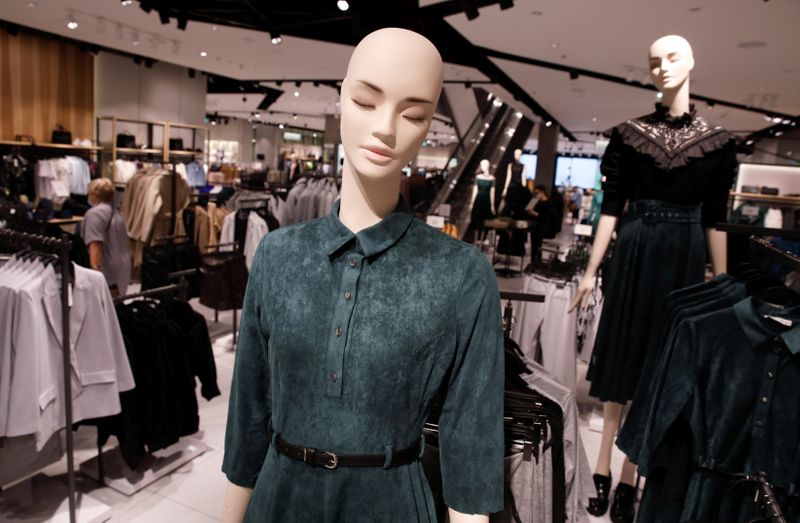By Anna Koper and Michael Kahn
WARSAW/PRAGUE (Reuters) - Poland's big clothing and footwear retailers LPP (WA:LPPP) and CCC (WA:CCCP) are switching focus back to eastern Europe, sizing opportunities to add brick-and-mortar stores as international rivals concentrate on online sales during the pandemic.
LPP - eastern Europe's answer to H&M (ST:HMb) and Inditex 's (MC:ITX) Zara - has expressed ambitions to emulate its two rivals as a top five global fashion brand.
Those plans have stalled as the pandemic has hit consumer spending, but with eastern Europe weathering the crisis better than Western economies, the retailer sees better prospects in its home region.
"Our approach to expansion has changed due to the epidemic," LPP's Deputy Chief Executive Przemyslaw Lutkiewicz told Reuters. "We hope that from the next year we will return to the expansion of new stores, but mainly in the eastern markets."
LPP's push comes as some big Western brands - which flocked to the region in around 2000 to take advantage of rising incomes and fast economic growth - shut stores in eastern and central Europe.
French fashion retailer Camaieu, which is looking for a buyer as it struggles to survive the coronavirus crisis, is preparing to close 27 stores in the Czech Republic and has shut 25 in Poland, among other overseas locations, as it focuses on its domestic market.
Meanwhile Inditex said in June it would close up to 1,200 smaller stores within two years, including a chunk in Europe of its Zara and Pull&Bear outlets, in a move to focus on online sales and big stores in prime shopping districts.
Analysts say that in tough times it makes sense for West European retailers to concentrate on their core markets.
"The fact that the top level players are wanting to limit their presence (in emerging markets) opens up opportunities for Polish brands," PwC Warsaw-based partner Grzegorz Laptas said.
Shoe and bag retailer CCC - whose products include Sprandi sports shoes and Lasocki and Jenny Fairy shoes and bags - has scaled back expansion plans this year but aims to make new investments in eastern Europe next year.
"We will definitely be opening stores in Romania or Russia, because these are good markets," Marcin Czyczerski, chief executive of CCC - which is one of Europe's largest shoe manufacturers - told Reuters.
Eastern and central Europe flourished in recent years thanks to a flow of EU funds and investment by global companies taking advantage of lower wages and a skilled workforce, and the region has seen fewer cases of COVID-19 than bigger European countries.
Retail sales returned to growth in July in Poland, the Czech Republic and Hungary, and Poland is set to be the EU's most resilient economy this year with GDP set to fall by 4.6%, according to European Commission forecasts, compared to 8.7% for the euro zone.
Gdansk-based LPP, which sells its biggest brand 'Reserved' in 25 countries, has been particularly hard hit by high costs and low sales in Germany where it has 19 stores.
The retailer expects its total revenue to drop as much as 30% in 2020, against a pre-pandemic forecast for a double-digit rise, but plans to increase its retail space by more than 10% next year, mainly in eastern Europe.
The apparel and footwear market in Poland, Romania and Russia at around 55.2 billion euros in 2019 is less than half the combined size of Britain and Germany, according to Euromonitor International data.
However, per capita spending growth on a constant currency basis in markets like Poland and Romania has been faster at 19% and 43% respectively between 2015 and 2019, compared to a 6% rise in Britain and a 1.5% decline in Germany.
BRAND RECOGNITION
Western brands are perceived in eastern Europe as offering higher quality, prompting LPP to use an English name for its Reserved brand, associating it with restaurant dining - considered a luxury in Poland when the brand was set up in 1998.
In 2015 research by GfK Polonia showed that only around 10% of Poles knew that Reserved was a Polish brand.
By investing in bricks and mortar, LPP and CCC are betting that consumers in the east still prefer to buy in-store rather than online.
According to Euromonitor data, the share of e-commerce in Poland, Romania and Russia in 2019 hovered between 13-14% compared to 25% in Germany and 27% in Britain.
For many Russians and east European consumers, fashion retailers' online offerings fall short.
"Online, I cannot try things on, see how they fit," said Yekaterina, a Muscovite out shopping in the Russian capital. "And once they are delivered they hardly ever meet expectations, one often has to do returns."
Habits are also changing, accelerated by the pandemic.
LPP says its online business is now another priority after its global online sales leapt to a third of its total sales in the first quarter, from less than 12% for the whole of last year, due to store closures during lockdowns. However, it still expects online shopping to take off only gradually in eastern Europe.
"Eastern markets are different... customers prefer traditional ways of shopping, so we will simply open more stores there," Lutkiewicz said.
CCC has also seen a surge in online sales globally, but sees a chance to snatch market share from smaller local rivals in the region offloading store space due to the pandemic - at relatively low cost.

"There are many entities that have a dozen or several dozen stores in their portfolios that will go bankrupt or close their operations, and thus allow others to take over these shares without having to invest in stores or without additional expenditure," CEO Czyczerski said.